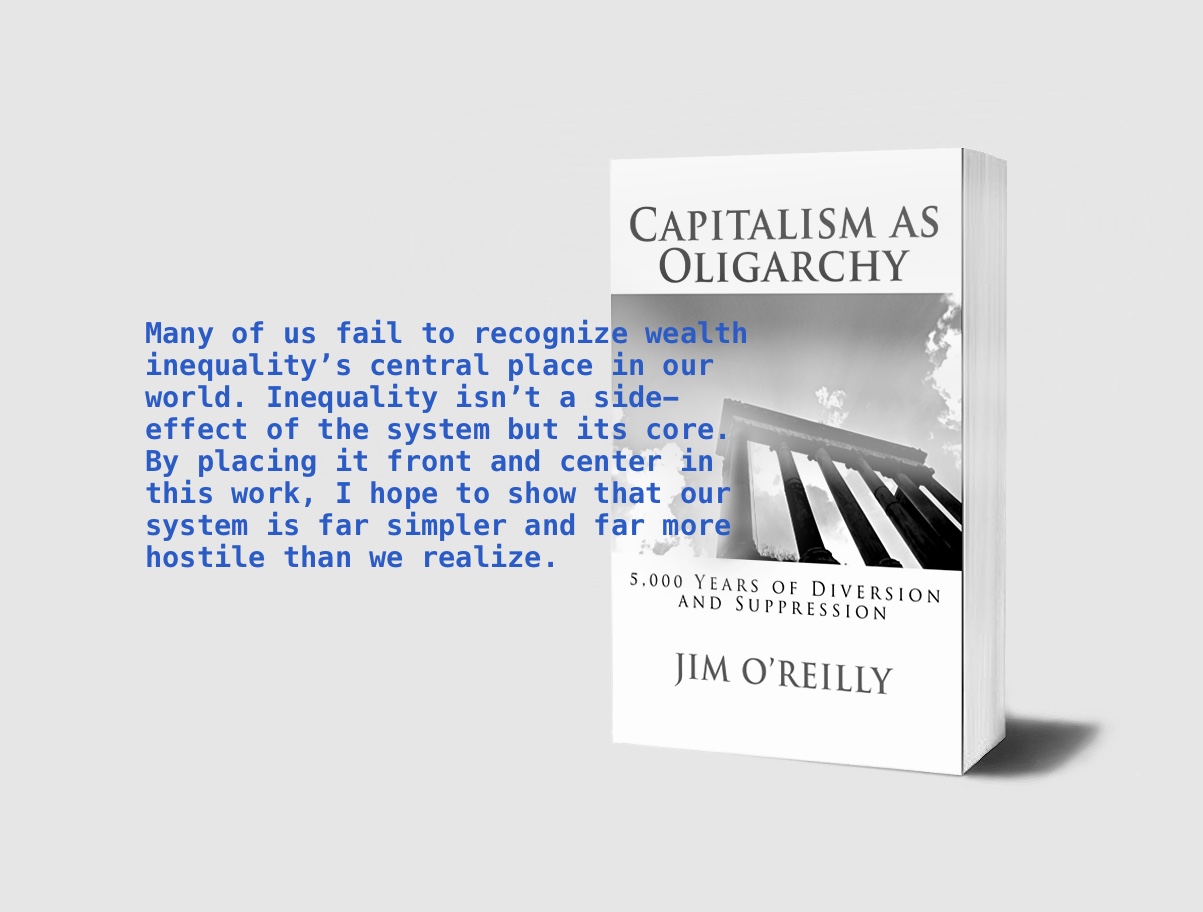It’s an oligarchic world
Hillary Clinton told us the other day that “the United States and many others around the world have a strong commitment to democracy and human rights. It’s part of who we are.” She didn’t elaborate on what the other parts of our nature may be, but certainly they include a strong commitment to propping up dictators who support commercial interests, overthrowing democracies that don’t, and instituting endless wars to strengthen geopolitical interests.
Hillary aside though, what does democracy really mean and how do we know whether we have one? Surely it’s more than having a few token elections every now and then. Does it count as “democracy” if elections are formally open but no candidate has a chance without accumulating tremendous sums of money? What if the organs of propaganda are tightly controlled by those with money permitting relatively easy management of a population? Or if strong armed forces / security apparatuses sit just off the sidelines setting ultimate boundaries on acceptable policies? What if each individual polity were too small by itself to stand up to wider global forces?
To help answer the question of whether a country is a democracy, we could turn to the Washington based NGO Freedom House which issues a yearly “Freedom in the World” report or to the Economist which issues a similar publication. Both these organizations though have their own agenda and ideology, the Freedom House being closely associated with US foreign policy interests and the Economist with laissez faire economics.
Far better, I think, to turn to Aristotle who famously contrasted oligarchy with democracy. Oligarchy, he wrote, was when “men of property have the government in their hands”. We have a democracy “when the free, who are also poor and the majority, govern, and an oligarchy when the rich and noble govern, they being at the same time few in number”. Of course the more powerful the poor, the less rich the rich.
The Aristotelian opposition between democracy and oligarchy is greatly relevant and recognition of this divide opens windows of understanding that are often clouded by a self interested mainstream discourse that minimizes it in favor of a focus on the purely formal institutions of democracy. It seems inconceivable that we could have gross inequality in a system in which the majority truly ruled and any system which has great inequality therefore can’t be truly democratic. The level of true democracy, then, can very reasonably be assessed by the level of inequality. Such a measure cuts through appearances and looks solely at outcomes. It takes into account the power of money and propaganda within the “democratic” form. It ultimately tells us, imperfectly to be sure, whose interests rule in a society by simply looking at how resources are distributed. Societies which share them widely can reasonably be considered “democratic”, regardless of form.
We have widely available measurements for each country using what’s known as the gini coefficient. This number isn’t very intuitive but it measures the degree a society deviates from pure equality. The higher the number, the more unequal the society. Zero is perfect equality, 100 is total inequality. Data is available based on income and on wealth. Which is a better indicator? I think wealth tells us more in that it would seem to correlate better with the degree of power. Once a certain level of income is attained by those at the very top of society, additional increments mean little. The degree of ownership is what really counts. The table below presents the gini coefficient for wealth beginning with the most “democratic” to the least. Also presented is the wealth owned by the top 10% based on this research paper.
| Gini | 10% | |
| Japan | 0.547 | 39.3 |
| China | 0.550 | 41.4 |
| Spain | 0.570 | 41.9 |
| Australia | 0.622 | 45.0 |
| Greece | 0.654 | |
| Germany | 0.667 | 44.4 |
| Canada | 0.688 | 53.0 |
| Egypt | 0.689 | |
| UK | 0.697 | 56.0 |
| Russia | 0.699 | |
| Venezuela | 0.712 | |
| Sweden | 0.742 | 58.6 |
| Mexico | 0.749 | |
| Brazil | 0.784 | |
| US | 0.801 | 69.8 |
The entire world has a gini coefficient of .804, clearly very far from democratic. These are interesting numbers. Even the best scoring nations are far from what true democracy would be expected to produce. The most democratic shown are Japan, China, and Spain. What can we make of China, having no formal democracy, rating far better than the near pure oligarchy of the United States? I think the outward form of government means little in this comparison. Neither are democracies, China is ruled by a clearly visible dictatorship, the US by a slightly hidden oligarchy. Inequality is growing greatly in China but the majority at present still seem to have far more influence in the division of wealth than in the US and therefore can be said to “rule” to a greater degree. Which, of course, is not to say that China is anything close to an egalitarian nation.
The US ranks even worse than the key Latin American oligarchies of Brazil and Mexico. The numbers put a lie to the notion that Brazil is anything but an oligarchy, despite it’s recent “center-left” governments. The same can be said of Chávez’s “socialist” Venezuela. And Sweden, contrary to what many would think, is no bastion of democracy.
The above listing really just shows relative states of oligarchy. The democratic revolutions that began a couple hundred years ago don’t seem to have accomplished much. There’s a very long road ahead and the rising global discontent must be of increasing worry to those who rule.
One thing for sure, though, let’s all have a great laugh the next time Hillary tells us of her great love for democracy.

